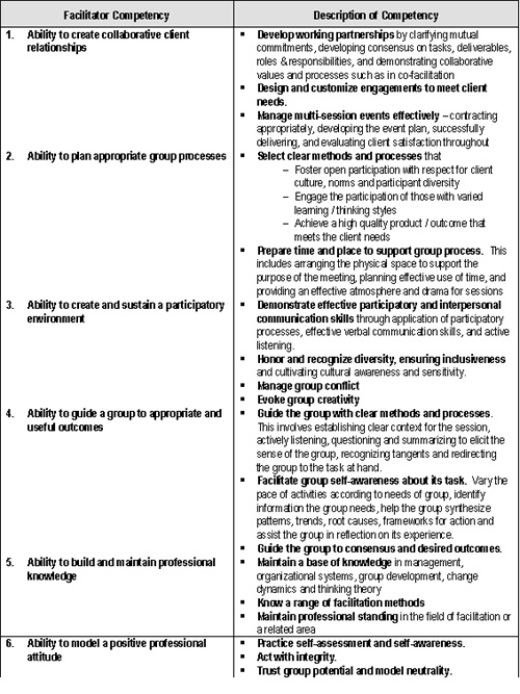In the past year I’ve heard increased chatter about the need for improved facilitation skills in the BPM arena including at the November New York BrainStorm BPM Conference where facilitation skills were highlighted as a necessary competency of Business Analysts1. So what are these facilitation skills everyone is talking about?
What is Facilitation?
Simply put, facilitation is a structured way of helping teams think, discuss, and make decisions in order to achieve their desired goals. And, like any other discipline, it requires a specialized skill set. The larger or more complex the situation, the more honed the skills of the facilitator need to be.
Facilitation is similar to acting as a scout. The scout doesn’t select the travel destination; instead he or she applies the requisite survival skills and planning techniques to get the travelers wherever they want to go. But beware. It’s not the simple packaged approach of a tour guide. Scouting, like facilitation, requires a good set of skills to continually analyze the terrain, assess the environment, and evaluate the traveler’s capabilities and tolerances. And a good scout will continually question the travelers throughout the journey to assure that it still aligns with their vision and desires. In other words, the facilitator is “a content neutral individual who uses effective processes to enable a group to make effective decisions and accomplish its task while supporting a collaborative and respectful environment that encourages full participation and helps groups overcome barriers to reaching their goal.”2
What are the Key Facilitation Skills a BPM Professional Must Have?
The International Association of Facilitators (IAF) has defined six core competencies for facilitators (see Table 1 for a synopsis). Demonstration of these competencies is necessary to attain the status of IAF Certified™ Professional Facilitator and provide the foundation upon which more specialized skills like negotiation, graphic facilitation, requirements elicitation, etc. can be built.
Where Can I Get Training in Facilitation Skills?
To improve your general facilitation skills, learn more advanced, specialized facilitation skills, or gain additional tools & techniques to work with teams, here are a few organizations, in addition to my own, that have the experience and capabilities to provide expert instruction.
- The Villard Group
- Resource Advantage, Inc.
- MG Rush Consulting
- Leadership Strategies
How to Get Started Now.
Facilitation is part technique, part art. Training can teach you the skills; but art is learned from experience. So, from my experience, let me share 5 things which will immediately improve your facilitation skills.
1. Become more self-aware. Observe your behaviour in relation to others. Do you talk or listen more? Do you speak figuratively or literally? Do you relate emotionally or with facts and figures? Do you solve it or discuss it? A good facilitator must be aware of their own strengths, weaknesses, and preferences. Once aware, we can better decide how to alter or offset any barriers that might impede our interactions with others.
2. Get an appreciation of the why. Too often we get tunnel vision. We strive to finish a task simply because it’s on the list, rather than asking if it’s really necessary. As a facilitator, you need understand the why hidden behind the tasks. You need a reasonable answer to questions like “Why do we need to do this project? Why do we need to hold this meeting? Why should we create this particular deliverable? Why should this deliverable be in this format?” There may be good answers or you may find that no one has ever questioned the status quo. Good facilitotors try to understand why.
3. Identify key collaboration points at the onset. When you get assigned to a project, think through your deliverables to determine if there would be value in bringing diverse expertise or points of view together to contribute content. This will allow you to get funding and build them into the plan at the start. I’ve found collaborative meetings or “working sessions” to be most valuable when developing cross-organizational processes, defining project timelines, validating business requirements, and performing project progress assessments.
4. Build planning time into your schedule. Consider this scenario. You are the wedding planner responsible for ensuring that your bosses’ wedding goes off without a hitch. Are you going to send out invitations to anyone you can think of and then just show up and hope all goes well? Of course not. It takes time to plan logistics, craft communications, do the necessary pre-work, and get everything in order to ensure a memorable outcome. Successful collaboration requires no less. Like a wedding, it’s a process as much as an event. Realize that you’re going to spend at least 2-to-3 times as much time and effort preparing for the event as you do attending it. Schedule accordingly.
5. Practice basic meeting management skills. For tools and techniques to better control meetings, improve meeting attendance, and get yourself and your team prepared, check out my previous article titled “The Other BPM: Being Productive in Meetings”.
Can You Play Dual Roles?
This question often comes up when discussing the role of the facilitator. Many companies don’t have the luxury or budget to afford shared facilitation resources independent of other roles. So, yes, you can be both the Business Analyst and the facilitator of an event. But the real question is not can you, but should you play dual roles? You’ll never be able to fully participate if you’re playing the role of facilitator. So you have to ask what’s in the best interest of the project – to have you as a contributor or process guide.
To help you make that decision, run through the following questions. If you answer “no” to any of them, think about getting someone else to facilitate.
- Can I remain objective about the issues being discussed during the meeting?
- Can I allow the team to make decisions that are contrary to my opinion on this topic?
- Can I focus on guiding the meeting process rather than contributing to discussion?
- Am I able to use my knowledge around this topic to ask questions rather than suggest or dictate solutions?
- Will I be able to manage the group dynamics (treating all parties as equals) without fear of reprisal to my career?
- Will I be able to handle challenges to the meeting process and/or agenda without taking it personally?
- And even if you can do all those things, can the team you’re working with…
- View you as unbiased or objective regarding the outcome?
- Allow you to play the role of process guide rather than a content expert?
So for those high visibility, cross-organizational collaborations, decide if you need to participate or facilitate. Don’t just assume you’re the right person for the job.
TABLE 1 – Synopsis of IAF Facilitator Core Competencies3

References:
- Hilty, J. and Laware, G. The Pivotal Role of the Business Analyst in a Service-Oriented World. Executive Briefing, Vol. 1, May 2006.
- Rush, G. Group Facilitation and Collaboration Forum. 2007.
- The International Association of Facilitators. Certification Competencies.

















